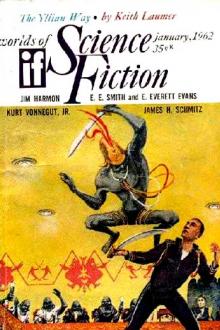Bat Wing by Sax Rohmer (bts books to read .TXT) 📗

- Author: Sax Rohmer
Book online «Bat Wing by Sax Rohmer (bts books to read .TXT) 📗». Author Sax Rohmer
It seemed to me, personally, that an almost palpable shadow lay upon the room. Although, save for this one lapse, our host throughout talked gaily and entertainingly, I was obsessed by a memory of the expression which I had detected upon his face that morning, the expression of a doomed man.
What, in Heaven’s name, I asked myself, did it all mean? If ever I saw the fighting spirit looking out of any man’s eyes, it looked out of the eyes of Don Juan Sarmiento Menendez. Why, then, did he lie down to the menace of this mysterious Bat Wing, and if he counted opposition futile, why had he summoned Paul Harley to Cray’s Folly?
With the passing of every moment I sympathized more fully with the perplexity of my friend, and no longer wondered that even his highly specialized faculties had failed to detect an explanation.
Remembering Colin Camber as I had seen him at the Lavender Arms, it was simply impossible to suppose that such a man as Menendez could fear such a man as Camber. True, I had seen the latter at a disadvantage, and I knew well enough that many a genius has been also a drunkard. But although I was prepared to find that Colin Camber possessed genius, I found it hard to believe that this was of a criminal type. That such a character could be the representative of some remote negro society was an idea too grotesque to be entertained for a moment.
I was tempted to believe that his presence in the neighbourhood of this haunted Cuban was one of those strange coincidences which in criminal history have sometimes proved so tragic for their victims.
Madame de Stämer, avoiding the Colonel’s glances, which were pathetically apologetic, gradually recovered herself, and:
“My dear,” she said to Val Beverley, “you look perfectly sweet to-night. Don’t you think she looks perfectly sweet, Mr. Knox?”
Ignoring a look of entreaty from the blue-gray eyes:
“Perfectly,” I replied.
“Oh, Mr. Knox,” cried the girl, “why do you encourage her? She says embarrassing things like that every time I put on a new dress.”
Her reference to a new dress set me speculating again upon the apparent anomaly of her presence at Cray’s Folly. That she was not a professional “companion” was clear enough. I assumed that her father had left her suitably provided for, since she wore such expensively simple gowns. She had a delightful trick of blushing when attention was focussed upon her, and said Madame de Stämer:
“To be able to blush like that I would give my string of pearls—no, half of it.”
“My dear Marie,” declared Colonel Menendez, “I have seen you blush perfectly.”
“No, no,” Madame disclaimed the suggestion with one of those Bernhardt gestures, “I blushed my last blush when my second husband introduced me to my first husband’s wife.”
“Madame!” exclaimed Val Beverley, “how can you say such things?” She turned to me. “Really, Mr. Knox, they are all fables.”
“In fables we renew our youth,” said Madame.
“Ah,” sighed Colonel Menendez; “our youth, our youth.”
“Why sigh, Juan, why regret?” cried Madame, immediately. “Old age is only tragic to those who have never been young.”
She directed a glance toward him as she spoke those words, and as I had felt when I had seen his tragic face on the veranda that morning I felt again in detecting this look of Madame de Stämer’s. The yearning yet selfless love which it expressed was not for my eyes to witness.
“Thank God, Marie,” replied the Colonel, and gallantly kissed his hand to her, “we have both been young, gloriously young.”
When, at the termination of this truly historic dinner, the ladies left us:
“Remember, Juan,” said Madame, raising her white, jewelled hand, and holding the fingers characteristically curled, “no excitement, no billiards, no cards.”
Colonel Menendez bowed deeply, as the invalid wheeled herself from the room, followed by Miss Beverley. My heart was beating delightfully, for in the moment of departure the latter had favoured me with a significant glance, which seemed to say, “I am looking forward to a chat with you presently.”
“Ah,” said Colonel Menendez, when we three men found ourselves alone, “truly I am blessed in the autumn of my life with such charming companionship. Beauty and wit, youth and discretion. Is he not a happy man who possesses all these?”
“He should be,” said Harley, gravely.
The saturnine Pedro entered with some wonderful crusted port, and Colonel Menendez offered cigars.
“I believe you are a pipe-smoker,” said our courteous host to Harley, “and if this is so, I know that you will prefer your favourite mixture to any cigar that ever was rolled.”
“Many thanks,” said Harley, to whom no more delicate compliment could have been paid.
He was indeed an inveterate pipe-smoker, and only rarely did he truly enjoy a cigar, however choice its pedigree. With a sigh of content he began to fill his briar. His mood was more restful, and covertly I watched him studying our host. The night remained very warm and one of the two windows of the dining room, which was the most homely apartment in Cray’s Folly, was wide open, offering a prospect of sweeping velvet lawns touched by the magic of the moonlight.
A short silence fell, to be broken by the Colonel.
“Gentlemen,” he said, “I trust you do not regret your fishing excursion?”
“I could cheerfully pass the rest of my days in such ideal surroundings,” replied Paul Harley.
I nodded in agreement.
“But,” continued my friend, speaking very deliberately, “I have to remember that I am here upon business, and that my professional reputation is perhaps at stake.”
He stared very hard at Colonel Menendez.
“I have spoken with your butler, known as Pedro, and with some of the other servants, and have learned all that there is to be learned about the person unknown who gained admittance to the house a month ago, and concerning the wing of a bat, found attached to the door more recently.”
“And to what conclusion have you come?” asked Colonel Menendez, eagerly.
He bent forward, resting his elbows upon his knees, a pose which he frequently adopted. He was smoking a cigar, but his total absorption in the topic under discussion was revealed by the fact that from a pocket in his dinner jacket he had taken out a portion of tobacco, had laid it in a slip of rice paper, and was busily rolling one of his eternal cigarettes.





Comments (0)